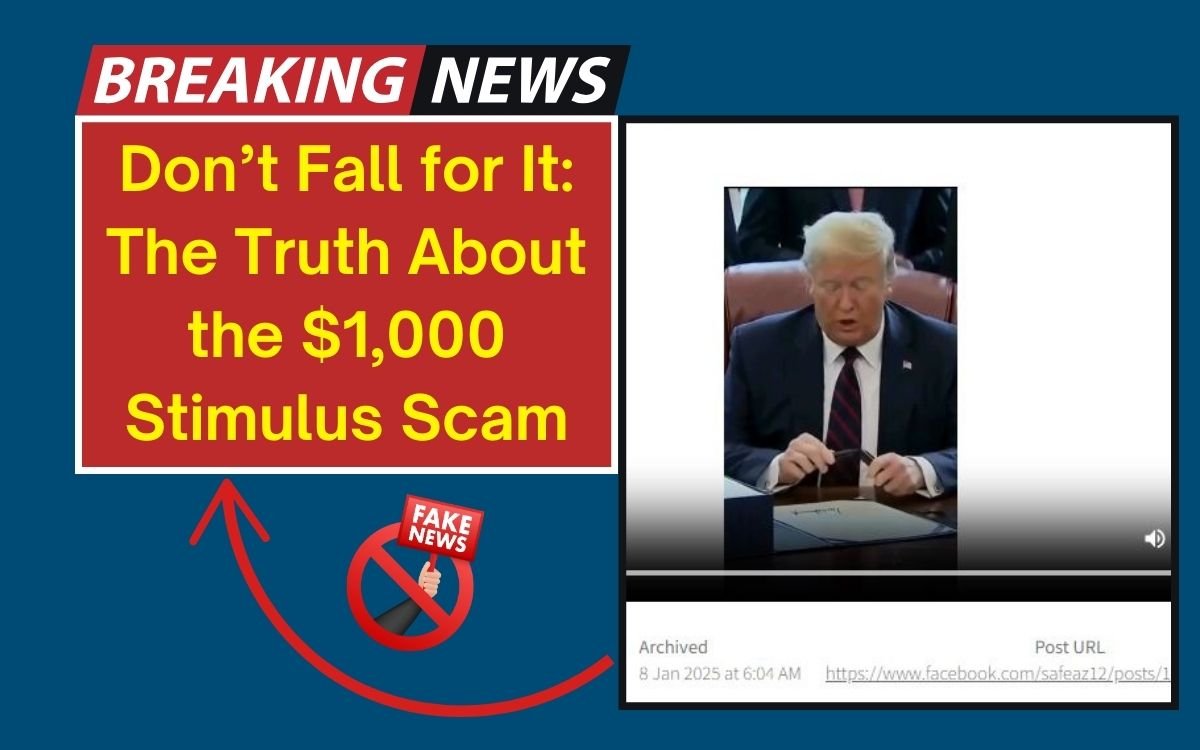Social media is abuzz with claims about a new program offering $1,000 stimulus checks to help cover living expenses. These posts include images of President-elect Donald Trump and promise easy access to emergency funds. However, as of January 9 2025, no such program exists and these claims are false.
A recent Facebook post states, “Claim your giveback benefit before it disappears.” Another video claims, “You were supposed to get your $1,000 emergency relief card this week.” It even suggests the process involves no proof of income or personal information. The post urges viewers to click a link to claim their benefit.
Unfortunately, these posts are part of a scam. They direct users to non-government websites that seek to collect personal information, potentially putting users at risk.

Table of Contents
How $1,000 Stimulus Scam Works
The posts link to a website called PrizeStash, which features an image of a Visa gift card. The site asks users to provide their name, address, phone number and email. In the fine print, it mentions users are consenting to marketing from affiliated companies.
These scams prey on trust often using recognizable figures like Donald Trump to appear credible. However, President-elect Trump has not announced any emergency stimulus programs. In fact Trump will not officially take office until January 20, 2025.
Why These Claims Are False?
The IRS has confirmed that three official stimulus payments were issued during the COVID-19 pandemic: one in 2020 and two in 2021. People who missed claiming the 2021 Recovery Rebate Credit can still file their 2021 tax returns before April 15 2025 to receive the funds.
However, the current social media posts do not reference these legitimate payments. Instead they falsely imply that a new stimulus program has been passed. As of now no credible news reports or government announcements confirm any such program exists.
How to Spot and Avoid Scams?
Scammers often use tactics to pressure or mislead individuals. According to the Federal Trade Commission (FTC), here are some common warning signs:
- Pretending to be from a trusted organization.
- Claiming there’s a problem or prize to get your attention.
- Urging you to act quickly without verifying the source.
The government has repeatedly warned that it does not provide free money for personal use through grants or relief programs.
Official Sources and What You Can Do
If you’re unsure about an offer always verify it through trusted sources like the official USA Gov website. You can also report scams to the FTC to help protect others.
For more accurate updates on financial relief programs, check out our guide to Stimulus Checks for 3 states in 2025 or learn about claiming back retirement benefits in our Social Security Deadline Guide.
FAQs
1. Are there any new stimulus programs announced for 2025?
No, as of January 9, 2025, there have been no announcements about new stimulus programs.
2. How can I claim missed stimulus payments from previous years?
You can file your 2021 tax return before April 15, 2025, to claim the 2021 Recovery Rebate Credit.
3. What should I do if I suspect a scam?
Report suspicious activity to the Federal Trade Commission (FTC) through their official website.
The Final Words on Social Media $1,000 Stimulus Scam
Social media can be a powerful tool, but it’s also a breeding ground for scams. Always double-check claims before clicking on any links or sharing personal information. Remember, if something sounds too good to be true, it probably is. Stay safe, and stay informed.
